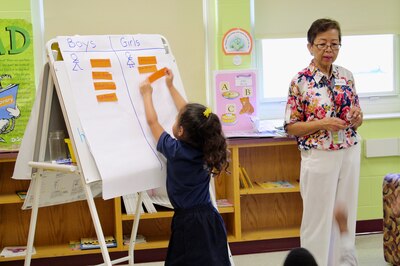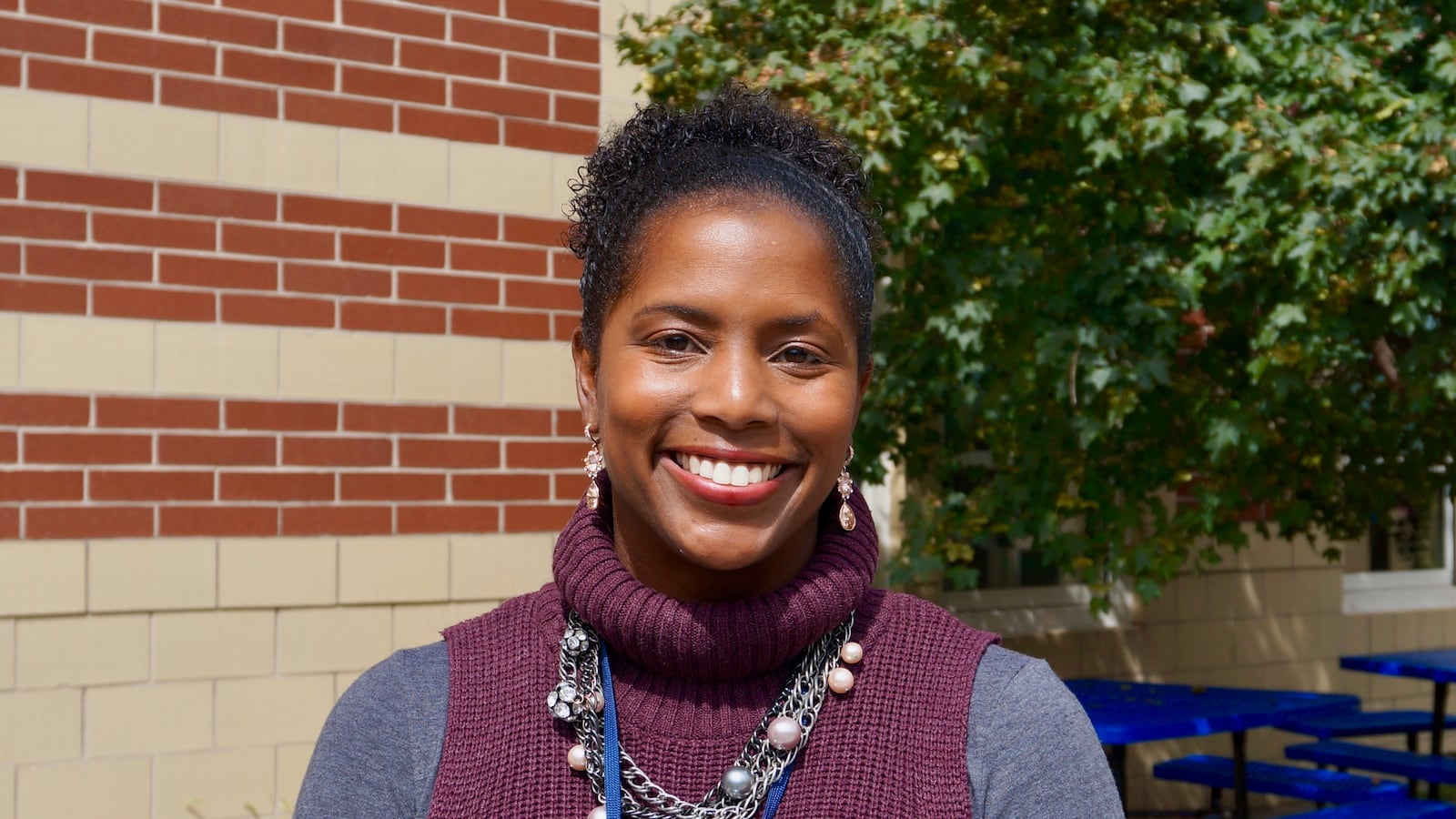A lot has changed at School 44 in just two years.
In January 2016, the elementary school for grades K-6 had suffered years of low test scores and failing grades from the state. It appeared on a list of campuses that could soon face takeover from the Indiana Board of Education. And two months later, that fate was forestalled when the Indianapolis Public Schools Board preempted the state and restarted it as an innovation school, with a new principal and new staff.
Now, in its second year as Global Prep Academy at School 44, the west side school of more than 500 students is no longer facing state takeover. Student passing rates on state tests jumped by 7.5 percentage points, and the school’s letter grade rose to an A (largely because innovation schools are graded by the state on a more generous scale during their first three years).

The school is led by Mariama Carson, a charismatic leader with nearly two decades of experience in urban education. Carson spent seven years as principal of Snacks Crossing, a neighborhood elementary school in Pike Township, before leaving to plan for a Spanish-English immersion charter school with funding from the nonprofit Mind Trust. Ultimately, she ended up working with IPS to restart School 44 as a charter school using the immersion model in the innovation network.
Carson offered an unusual piece of advice for other principals: Keep teaching. Principals are supposed to help teachers improve, so they need to practice those skills themselves, she said.
“I think a lot of principals get comfortable in offices and doing paperwork,” she said. “But you got to know the grind of a classroom, and you have to feel that tension between managing the kids and also teaching the skills.”
Chalkbeat sat down with Carson at School 44 last month to talk about what it’s been like to restart a school. Below are excerpts from the conversation, edited for clarity and brevity. (Carson also recently spoke to Chalkbeat about the Relay principal training program.)
What was last year like for you — and I guess I mean for you, but also for your school?
I liken it to when I first became a mother. You can read about what it’s like. You can imagine what the challenges will be, but there’s nothing like doing it yourself. And the first year of anything is hard.
We are very strong relationship-oriented people and really believe that this work is predicated on strong relationships. When you are new to a place, though, it’s hard to build that with everybody at the same time.
Teachers were building relationships with each other and with us as administrators. And kids were building trust with their teachers. And parents were building trust. All those things happening at once were really hard.
Everything was new. No one knew the way. We were creating the way as we did it.
It was the most challenging year I’d ever had professionally. Just seeing how the teachers rose to the challenges and made adjustments and were flexible beyond belief has been amazing.
Every parent we call shows up. So that tells me that the trust we worked hard to build last year is intact.
Do you have advice for other principals?
A principal’s best work is done in a classroom. My administrators, we all taught. So when we saw kids struggling, or we saw teachers struggling to make the content accessible to kids, we taught. I taught reading. I taught math. And I modeled for teachers what that looks like.
That’s the best part of my job. I never want to lose my teaching chops, and I always tell principals, keep your teaching chops because you need to be able to bust them out to work with kids who struggle. And then for kids, when your principal is teaching, it’s like, “Oh! I want to be a part of it.”
One of the things we saw mid-year with our math data for grade five and six, is the rigor was not there. So last year, we took the standards that needed to be taught and we broke them apart into what we call a math seminar. Based on the groups the kids were in, I taught a math seminar three days a week. I did the lesson planning.
Teachers have to see that too. We know how to exit plan, and we know how to use the data from the exit slips in order to inform instruction daily.
Why is it important for you to keep teaching?
The most important job I think of a principal is to coach teachers. If you’re an instructional leader, and you can’t coach instruction, and you don’t know how to do it — I don’t know that makes you an effective coach.
Any coach that’s not willing to get their hands dirty and get on that floor with the kids, to make the learning accessible, I think that’s limited coaching.
I know it’s not realistic for me to teach five days a week all day, because I’ve got other responsibilities. But I never want to stop doing that. I always look for opportunities to do it. I’m doing right now first grade — I’m teaching first-grade writing workshop.
Partly because I enjoy it, but teachers need to see, ‘I’m in this with you.’
You were a principal for years before this. … How is (being principal at an innovation school) different?
I was there for 7 years. But here’s the difference. When you are a principal in a district, or my experience in a district, I had an amazing superintendent. Mr. Jones, who was my mentor and still is, he lined everything up how it was supposed to be. There wasn’t a whole lot of decision making about how it looks in your building. When you open a new school, every decision is yours. That is the difference. I do attribute a lot of the gains to my Pike (Township) systems. A lot of stuff that we do here came from Pike. A lot of teachers on my leadership team came from Pike. So we had the same understanding about how to move the needle.
I always, always, always want to be in the position of a learner. I had grown and I had evolved. I felt like I was ready to do some things differently. Within a district that was tightly run and very well run, there wasn’t autonomy and flexibility.
I wanted that. I was ready for that. So that’s why I took the plunge.

